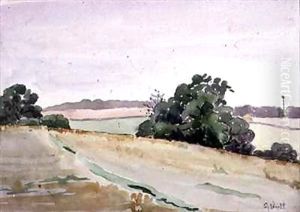Enoch Arnold Bennett Paintings
Enoch Arnold Bennett was an English novelist, playwright, critic, and essayist, born on May 27, 1867, in Hanley, Staffordshire, which is now part of Stoke-on-Trent. He was one of the principal figures of the early 20th-century literature in Britain, and his work is characterized by a keen observation of the details of everyday life, especially in the Five Towns, the Potteries district in Staffordshire, which he fictionalized in his writing.
Bennett's early career was in journalism, but he shifted to writing full time after the success of his first novel 'A Man from the North' in 1898. He later moved to Paris, where he became friends with other literary figures of the time and honed his writing craft. In Paris, Bennett was influenced by the Old World culture and the bohemian lifestyle, which helped shape his perspectives.
His most famous works include the 'Clayhanger' trilogy – 'Clayhanger' (1910), 'Hilda Lessways' (1911), and 'These Twain' (1916) – and 'The Old Wives' Tale' (1908), which is often considered his masterpiece. 'The Old Wives' Tale' follows the lives of two sisters and their divergent paths, providing a detailed and empathetic portrayal of their struggles and triumphs in a changing world. His literature is often praised for its realism and the depth of its characterizations.
During World War I, Bennett was appointed Director of Propaganda for France at the Ministry of Information, where he used his writing skills to serve the war effort. His work in this period included both non-fiction and fictional propaganda.
Throughout his life, Bennett was also a prolific journalist and critic, contributing to many periodicals and writing his own weekly articles. He had a significant influence on English literary taste during his time, though his reputation would wax and wane in the years after his death.
Sadly, Bennett died of typhoid on March 27, 1931, after drinking contaminated water in France. Despite the decline in his critical reputation after his death, in recent years, there has been a renewed interest in his work, with critics and readers alike celebrating his literary contributions and his ability to capture the essence of the Edwardian era.

